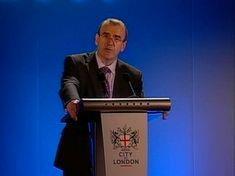
Tesco chief executive Sir Terry Leahy has insisted that the power of the consumer and an unswerving belief in free trade will be paramount in seeing the world through the recession.
Delivering the annual City Food Lecture at London’s Guildhall last week, Sir Terry insisted that the market economy has brought immense benefits to the world, including an explosion of consumer choice, cheaper food and job creation. “Retail has been the engine for social mobility - raising people out of poverty, creating prosperity, security and opportunity,” he told food industry leaders. “The market economy has more detractors than ever before - it is not perfect. But it is far better than any other system.”
Retail today is “highly dynamic, competitive and relentless - it is like fighting a general election every day in which the public vote with their wallets,” he continued, adding that developing new products and ideas and delivering what the consumer wants can create more business, and thus help lives around the world.
But panel member Lord Krebs, principal of Jesus College Oxford and a leading scientist in the field of behavioural ecology, said that the benefits to the world outlined by Sir Terry have been bought at an enormous cost that the world has yet to pay - the cost to the environment. “Consumers inherently think short term, and their immediate target is cheaper food. Pure consumerism means short-term gains, put before long-term gains,” he told delegates.
And fellow panel member Peter Kendall, president of the National Farmers’ Union, also responded robustly to Sir Terry’s presentation, which painted a somewhat cosy picture of life in the Tesco supply chain. “Lots of farmers in this room passionately believe in the free market, want a deregulated environment and understand that consumers are our salvation,” insisted Kendall. “But we do also believe in sensible, proportionate regulation. There is too much short-termism in the market, about just getting the price, and that is undermining confidence and planning in farming.”
The British farming industry does not advocate protectionism, added Kendall, but rather “an economic environment in which we can have a fair crack of the whip and the industry can thrive”.
Sir Terry took the chance to make clear his feelings against the Competition Commission’s proposal to implement an ombudsman to monitor retail-supplier relationships, warning against further regulation in the market. He also stressed that with short-term pressure on price greater than ever before, suppliers would be expected to pass falling commodity prices into the supply chain to ease pressure on shoppers.
And the issue of climate change will cause massive economic, social and political upheaval unless a framework is put in place drawing together government, businesses and consumers to tackle the problem, insisted Sir Terry. Tesco has invested in the University of Manchester’s Sustainable Consumption Institute, he told the floor, and has opened a supermarket in Manchester generating a third of the emissions of a standard store. “Some say that climate change, healthy eating and buying local will become luxuries in a recession, but that is a misleading argument,” said Sir Terry. “Consumers’ desires will not diminish - they will just want more affordable products that meet these needs.”
Sir Terry ended the evening by stating that the food retail sector must not be too gloomy. “There is no shortage of investment into the supply chain - products are more innovative than ever and overall the chain is attracting capital,” he added.
A video of the evening, organised by London’s seven food livery companies, is available at www.cityfoodlecture.com.



